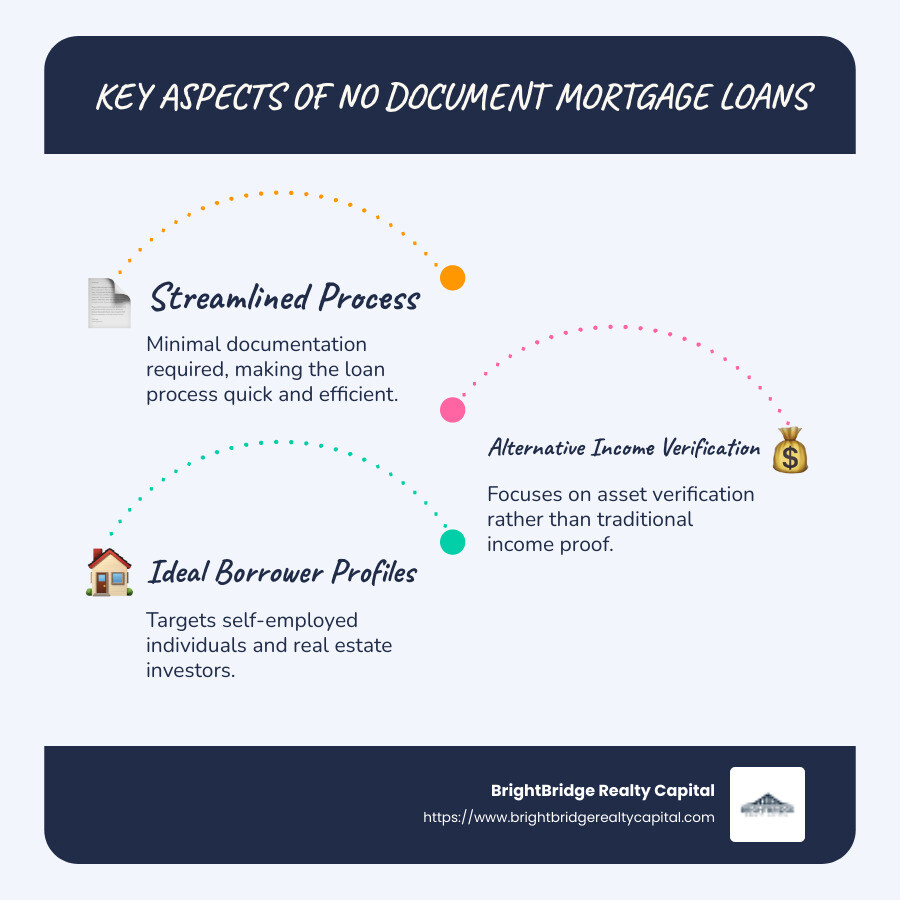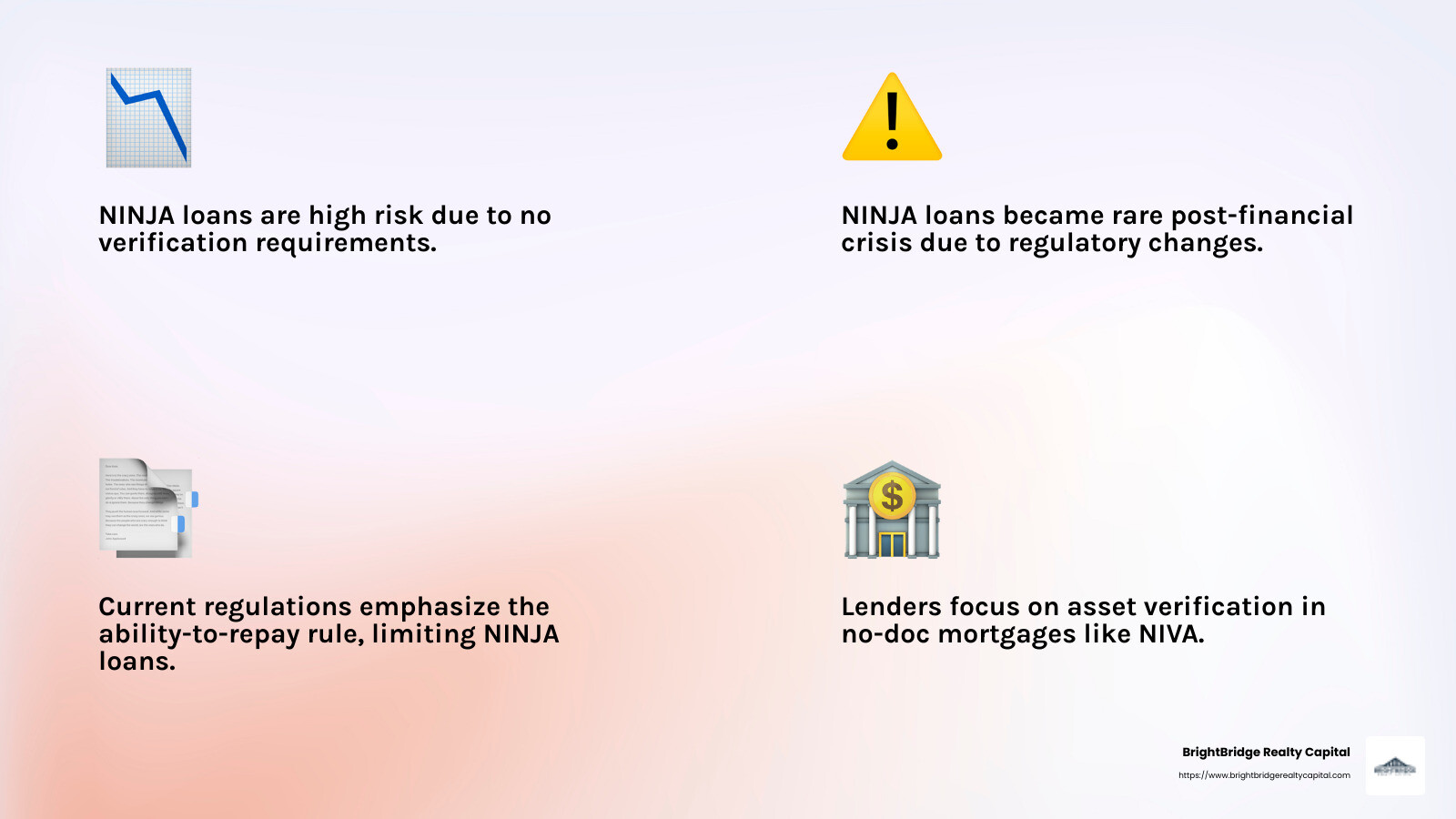The Lowdown on No-Doc Mortgages: What You Need to Know

No document mortgage loans can be a game-changer for real estate investors needing fast, flexible financing options without the hassle of proving income. Here's what you need to know quickly:
- Alternative to Traditional Mortgages: Skip the usual piles of paperwork.
- Ideal for Certain Borrowers: Suited for self-employed individuals or those with fluctuating incomes.
- Flexible Requirements: Lenders focus more on property value than detailed income verification.
- Investment Focus: Great for real estate investors purchasing rental properties.
No document—often called "no-doc"—mortgages cater to those who can't neatly fit into the traditional mold of homebuyers. These loans offer an expedited path, particularly for self-employed individuals and real estate investors who have their eyes on quick property acquisitions. Instead of scrutinizing pay stubs and tax returns, lenders here may only require proof of assets like bank statements, making the process swift and straightforward.
But don't think this flexibility comes without conditions. Lenders often require higher credit scores, substantial cash reserves, and larger down payments to offset the perceived risk of no-doc loans. Despite these problems, no-doc mortgages can be a valuable tool for those prepared to steer their specific demands.

No document mortgage loans terms explained:
What Are No Document Mortgage Loans?
No document mortgage loans, or "no-doc" loans, offer a unique way to secure a mortgage without the usual income verification process. Instead of the traditional mountain of paperwork, these loans focus on other factors to assess a borrower's ability to repay.
Key Features of No-Doc Loans
Minimal Income Verification: Unlike conventional loans, no-doc mortgages don't require you to submit W-2s, pay stubs, or tax returns. Instead, lenders might look at your bank statements or other asset documentation.
Diverse Mortgage Types: No-doc loans come in various forms, such as Stated Income-Stated Asset (SISA) loans, Stated Income-Verified Asset (SIVA) loans, and No Income-No Asset (NINA) loans. Each type varies in terms of the documentation required and the risk level involved.
Higher Entry Requirements: To balance the reduced documentation, lenders typically demand higher credit scores and larger down payments. A down payment of 30% or more is common, compared to the 20% often required for traditional mortgages.

Who Benefits from No-Doc Loans?
No-doc loans are particularly beneficial for:
Self-Employed Individuals: If your income fluctuates or isn't easily documented, a no-doc mortgage could be a suitable option.
Real Estate Investors: Those looking to quickly acquire investment properties might find no-doc loans appealing due to their faster approval process.
Foreign Nationals: Investors from outside the U.S. can also access these loans, making them a flexible option for diverse portfolios.
A Word of Caution
While no-doc loans offer flexibility, they also come with higher interest rates due to the increased risk for lenders. It's crucial to weigh these costs against the benefits when considering this type of mortgage.
In summary, no document mortgage loans provide a streamlined path to property ownership for those who might not fit the traditional borrower profile. However, the trade-offs in terms of higher costs and stricter requirements should be carefully considered.
Next, we'll explore how no-doc mortgages work in more detail, including the approval process and asset verification.
How No-Doc Mortgages Work
No-doc mortgages break away from traditional lending norms by simplifying the income verification process. Instead of the usual paperwork, these loans focus on a few key areas to decide if you qualify. Let's break it down.
Income Declaration
In a no-doc mortgage, you don't have to provide detailed income documents like W-2s or pay stubs. Instead, you may just need to declare your income. This can be particularly useful if you're self-employed or have irregular income streams.
However, simply stating your income isn't enough. While you might not need to provide traditional documents, lenders still want assurance that you can make your payments. They often look at other financial details to gauge your financial health.
Asset Verification
Instead of focusing solely on income, no-doc mortgages might require you to show proof of assets. Lenders may ask for bank statements or other financial documents to see if you have enough reserves to cover your mortgage payments.
For instance, if you have a substantial amount in savings or investments, this can be a significant factor in your favor. The idea is to prove you have the means to repay the loan even if your income isn't easily documented.
Loan Approval Process
The approval process for no-doc mortgages is typically faster than traditional loans. This speed is a huge advantage for real estate investors who need quick closings to secure properties in competitive markets.
Here's a simplified look at the process:
Application: You fill out a loan application, declaring your income and providing asset documentation if required.
Credit Check: Lenders will check your credit score. A higher score improves your chances of approval and might get you better terms.
Property Valuation: Since these loans often focus on the property's value, a thorough appraisal is crucial. Lenders want to ensure the property itself can cover the loan amount if needed.
Approval and Closing: If everything checks out, you can expect a quicker approval and closing process, sometimes within a few weeks.

No-doc mortgages shift the focus from income documentation to asset verification and property value. This flexibility makes them an attractive option for individuals who don't fit the traditional borrower mold, but understand the trade-offs, such as higher interest rates and more substantial down payment requirements.
Next, we'll dig into the different types of no-doc mortgages and what sets them apart.
Types of No-Doc Mortgages
No-doc mortgages come in various forms, each with its own unique set of requirements and benefits. Let's explore some of the most common types:
Stated-Income Loans
Stated-income loans allow borrowers to declare their income without needing to provide traditional proof, like tax returns or pay stubs. These loans are particularly useful for self-employed individuals or those with fluctuating incomes. However, lenders will still verify your assets and may require a high credit score to mitigate the risk.
SISA (Stated Income, Stated Assets)
SISA loans let borrowers state both their income and assets, without requiring verification. This type of loan gained notoriety during the housing boom for its ease of access. However, due to the lack of verification, these loans carry a higher risk and often come with higher interest rates.
SIVA (Stated Income, Verified Assets)
In a SIVA loan, borrowers state their income, but their assets are verified. This means you'll need to provide proof of your savings or investments to reassure the lender of your financial stability. SIVA loans strike a balance between flexibility and security, making them a popular choice for those with irregular income but substantial assets.
NIVA (No Income, Verified Assets)
NIVA loans take the focus off income entirely, relying solely on asset verification. This type of loan is ideal for individuals with significant savings or investments but who may not have a steady income to report. Lenders will scrutinize your asset documentation to ensure you can meet the mortgage payments.
NINJA (No Income, No Job, No Assets)
The NINJA loan is the most lenient of the no-doc options, requiring no income, job, or asset verification. These loans were prevalent before the financial crisis but are now nearly extinct due to the high risk they pose. Current regulations make it extremely difficult to find a NINJA loan today, as they do not adhere to the ability-to-repay rule.

Each type of no-doc mortgage offers varying degrees of flexibility and risk. While they provide opportunities for those who might not qualify for traditional loans, they often come with higher interest rates and larger down payment requirements. Understanding these differences is crucial in choosing the right option for your financial situation.
Next, we'll weigh the pros and cons of no-doc mortgages to help you make an informed decision.
Pros and Cons of No-Doc Mortgages
No-document mortgage loans, or no-doc mortgages, offer a unique set of advantages and challenges. Let's break these down to help you decide if they're the right choice for you.
Pros
Flexible Documentation Requirements
One of the biggest draws of no-doc mortgages is their relaxed documentation requirements. You won't need to gather tax returns, pay stubs, or employment letters. This makes them ideal for self-employed individuals, freelancers, or anyone with irregular income.
Quick Approval Process
The streamlined paperwork means faster approval times. If you're a real estate investor looking to quickly close a deal, a no-doc mortgage can be a game-changer.
Accessibility for High-Net-Worth Individuals
For those with significant assets but no regular income, no-doc loans can be a viable option. Asset-based loans allow you to leverage your wealth without the need for traditional income verification.
Cons
Higher Interest Rates
The flexibility of no-doc mortgages comes at a cost. Lenders charge higher interest rates to offset the increased risk. This can make your monthly payments significantly higher compared to traditional mortgage options.
Higher Risk for Lenders and Borrowers
No-doc loans are considered high-risk for both parties. Lenders face the risk of borrowers defaulting due to unverified income, while borrowers could struggle with high payments if their financial situation changes.
Limited Availability
Since the 2008 financial crisis, true no-doc mortgages have become scarce. While variants like bank statement or DSCR loans are still available, they are not as widespread and may require substantial down payments or high credit scores.
Risk Factors
Borrowers should be aware of the inherent risks involved. The lack of income verification means lenders rely heavily on your credit score and asset declarations. If your financial situation is unstable, a no-doc mortgage could lead to financial strain.
While no-doc mortgages offer flexibility and speed, they come with higher costs and risks. Carefully weigh these factors against your financial goals and capabilities before deciding. Next, we'll explore alternatives to no-doc mortgages to provide you with more options.
Alternatives to No-Doc Mortgages
If no document mortgage loans seem too risky or costly, there are alternatives that might better suit your needs. Let's explore some popular options: bank statement loans, asset-based mortgages, and DSCR loans.
Bank Statement Loans
What They Are:
Bank statement loans are designed for people with irregular income, like freelancers or business owners. Instead of traditional income documents, lenders use your bank statements to calculate your income.
Who They're For:
These loans work well for individuals who regularly deposit money into their accounts but may not have steady paychecks. If your bank statements show consistent deposits, this could be a great option for you.
Benefits:
- No need for tax returns or pay stubs.
- You can qualify with just 12 to 24 months of bank statements.
- Faster approval compared to traditional loans.
Considerations:
- You might face higher interest rates.
- A good credit score is often required.
- Some lenders may require a larger down payment.
Asset-Based Mortgages
What They Are:
Asset-based mortgages, also known as asset-depletion loans, let you use your assets to qualify for a loan. This can include investments, retirement accounts, or other liquid assets.
Who They're For:
These loans are ideal for high-net-worth individuals with significant assets but irregular income. If you have a robust portfolio, this could be a smart choice.
Benefits:
- No need for regular income verification.
- Leverage your wealth to secure a loan.
- Useful for those who are retired or have unearned income.
Considerations:
- Interest rates can be higher.
- You need substantial assets to qualify.
- The lender may divide your asset value by the loan term to determine qualifying income.
DSCR Loans
What They Are:
Debt Service Coverage Ratio (DSCR) loans are custom for real estate investors. They focus on the property's income potential rather than your personal income.
Who They're For:
These loans are perfect for investors looking to expand their property portfolio. If the rental income covers the mortgage payments, you’re likely to qualify.
Benefits:
- No personal income verification required.
- Quick approval process.
- Great for building a real estate portfolio.
Considerations:
- A high down payment is often needed.
- Interest rates may be higher than traditional loans.
- You must ensure the rental income covers the debt service.
Exploring these alternatives can help you find a mortgage solution that aligns with your financial situation and goals. Whether you're self-employed, have substantial assets, or are a real estate investor, there's likely an option that fits your needs. Next, we'll dive into frequently asked questions about no document mortgage loans to address common concerns.
Frequently Asked Questions about No Document Mortgage Loans
What is the minimum credit score required?
For no document mortgage loans, having a strong credit score is crucial. Since these loans don't rely on traditional income verification, lenders often look for higher credit scores to offset the risk. Typically, a minimum credit score of 660 is required, but some lenders might expect even higher. A solid credit history helps demonstrate your reliability as a borrower, making it easier to qualify for these niche products.
Can I get a no-doc mortgage for a primary residence?
Getting a no document mortgage loan for a primary residence can be challenging. These loans are primarily designed for real estate investors or those purchasing investment properties. The ability-to-repay rule requires lenders to verify income for primary residences, making no-doc options less feasible. However, there are exceptions, especially if you have substantial assets or other non-traditional income sources that can be verified. In such cases, asset-based mortgages might be a suitable alternative.
Are no-doc mortgages still available today?
Yes, no document mortgage loans are still available, but they are not as common as they once were. Post-Great Recession regulations have made these loans more niche, often requiring higher credit scores and larger down payments. While the term "no-doc" might be stigmatized, you can find similar products under names like bank statement loans or DSCR loans. These variations allow for some flexibility in documentation but come with higher interest rates and stricter lending criteria. If you're interested, it's best to look for portfolio lenders who specialize in these types of loans.
Understanding these aspects can help you steer the landscape of no document mortgage loans and make informed decisions about your borrowing needs. Next, we'll wrap up with how BrightBridge Realty Capital can offer customized financing solutions for your real estate ventures.
Conclusion
At BrightBridge Realty Capital, we understand that every real estate venture is unique. That's why we offer customized financing solutions custom to your specific needs. Whether you're an experienced real estate investor or just starting, our goal is to make the financing process as smooth and efficient as possible.
One of our standout features is our ability to provide quick closings, often within a week. This speed is crucial in the world of real estate, where opportunities can come and go in the blink of an eye. By cutting out intermediaries and working directly with our clients, we offer competitive rates and a seamless process.
For those considering no document mortgage loans, we provide options that cater to your individual circumstances. Our nationwide reach ensures that no matter where your investment properties are located, you have access to the capital you need.
If you're ready to explore how we can support your real estate investment strategy, contact us today. Let's bridge the gap with smart, flexible financing solutions designed just for you.


